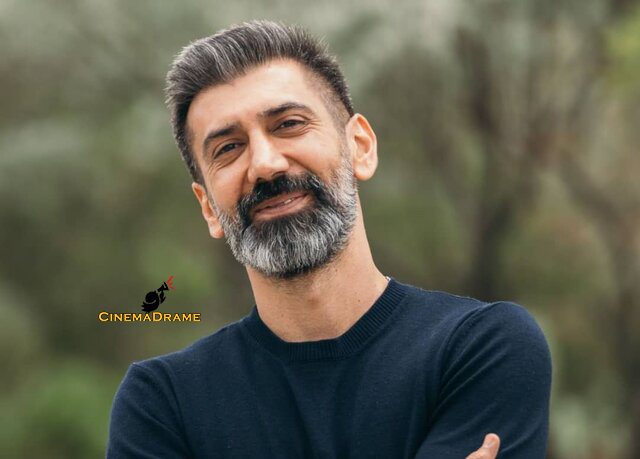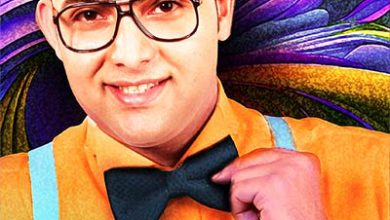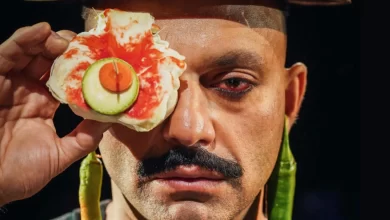Sina Razani and His First Directorial Experience in Theater: I Want to Distance Myself from Mafia Games for a While
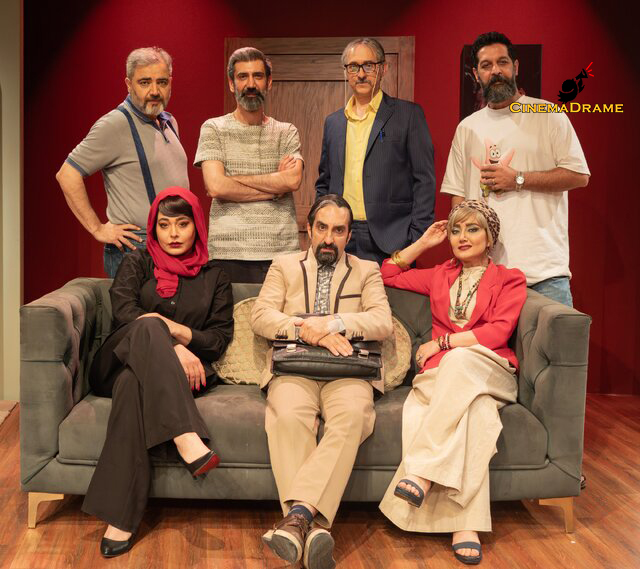
According to CinamaDrame News Agency, Sina Razani, who is currently making his directorial debut with the play “Taming the Wooden Horse,” emphasized that acting remains his main priority. He also stated his decision to distance himself from mafia-style games like “Godfather” for a while and return to his first home, which is theater.
Razani, who is experiencing his first directorial venture after over twenty years in acting, spoke in an interview about the enjoyable challenges of directing theater and stressed that he has put all his efforts into giving the audience a good feeling.
Regarding his entry into directing after years of acting, Razani said: “The idea of me getting into directing goes back years because I was interested in having my play pass through my own mental filter and present it to the audience. This has been and continues to be a difficult yet enjoyable challenge for me, and I waited several years until the conditions for this work were met.”
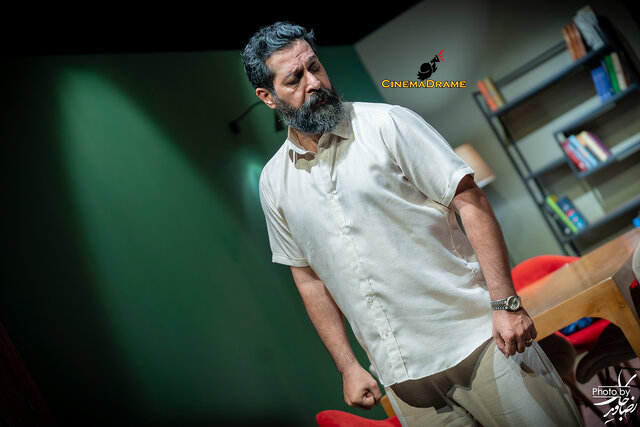
Razani added: “Since I didn’t want my play to be staged as a first-timer’s work, I tried to ensure the conditions for its execution were met, because a work performed in a professional setting is different from academic work and the etudes we do during college. Here, the audience has bought a ticket to watch the play and expects to see a professional work.”
The actor, who entered the acting world in 2000 with the play “Regret, Wish, and Dream” directed by Mehdi Hashemi, recalled: “That play was my first acting job, performed at Chaharsoo Hall, and it’s interesting that my first directorial work is also being staged in the same hall. Over these years, I have acted in more than 50 plays and tried to use the experience of these years in my play.”
Razani continued: “My focus was on the story and the performances, but gradually I realized that all components of a work are equally important, and as a director, one must pay equal attention to all aspects of the work.”
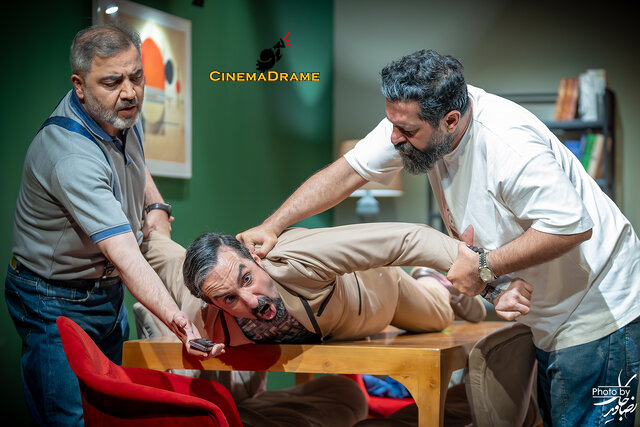
The Joy of Theater and Directing
Razani, emphasizing that he never intends to distance himself from the world of acting, also spoke of his desire to continue directing, adding: “I definitely want to continue directing, but I will never stray from my main path, which is acting, because my primary attachment is to acting.”
He explained that he tried to give the audience a good feeling with this play, stating: “Creating a good feeling for the audience has two aspects; in some cases, our colleagues forget that one of the most important aspects of theater is entertainment, and if we want the audience to receive our intended message, we must first entertain them and then convey our message while entertaining them, because if they feel like they’ve come to a classroom, they will feel bad.”
Razani, referring to the current societal conditions, added: “Currently, we all live under economic pressure, and in similar circumstances, we experience a kind of hardship and effort together. But I want to improve the audience’s mood so that, at least during the seventy-something minutes they are in our performance hall, they are freed from the outside world and its problems. Fortunately, our play has a captivating story, and the audience connects well with it. Through entertainment, we convey this small message to them: do not judge those around us and do not underestimate them.”
He continued: “The jokes in this play follow the logic of the script, because it has always been very important to me that families can watch a play together and not feel uncomfortable with its jokes.”
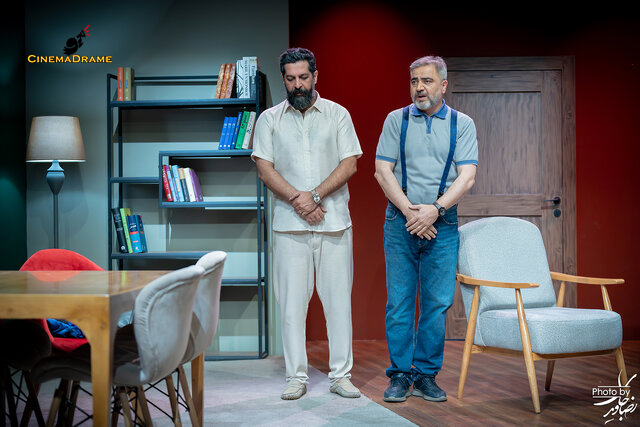
Storytelling and Social Commentary
Razani, providing explanations about the play’s story, added: “The story has always been very important to me. In this play, we are faced with gatherings that sometimes cause problems for families, and also with the issue of making fun of others. Perhaps these parties are not held with the intention of making fun of someone, but jokes happen in them that are very destructive. From the past until today, we have expressed many of our social protests in the form of jokes. It has been widely observed that we make fun of each other in virtual spaces, while this space is much larger than the space of a party.”
He continued: “We used these jokes as a pretext for this performance; annoying jokes that can overshadow our lives, and unfortunately, these jokes exist in our society. On the other hand, we have parties and gatherings that sometimes lead to the destruction of families.”
Razani, expressing satisfaction that the play has connected well with the audience, continued: “Our audiences fully connect with the moments of the play; we even had audiences who reacted verbally and couldn’t control themselves during the performance, and even more gratifying are the audiences who have come to watch the play two or three times.”
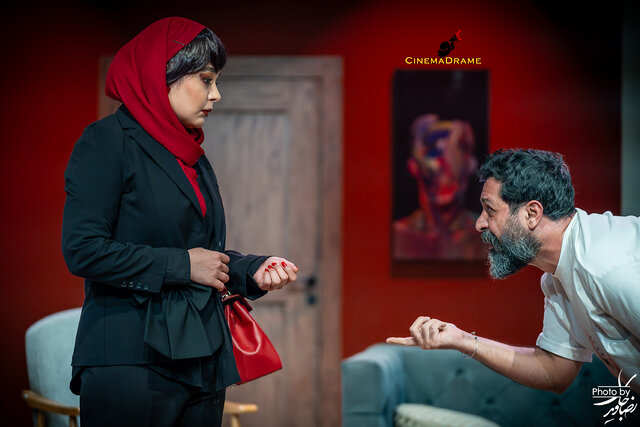
Challenges of Directing and Reality TV
Razani, who is now completing his first directorial experience, explained the challenges of creating and performing a theatrical work in the current conditions: “This entire work is full of challenges; artistic, administrative, social, economic, cultural, and so on. In this situation, we face a set of challenges that we didn’t experience in acting. A director must brainstorm equally with all members of the group. Of course, the presence of a supportive producer is very effective, just as my producer didn’t let me feel alone and supported me and my ideas. After all, directing is full of challenges and, of course, pleasure. The director’s mind is involved in everything from the actors to the stage, costumes, lighting, advertising, and even the audience member who might be unhappy with the temperature of the performance hall. The experience of directing this play will definitely be effective in my next acting roles and my interactions with the directors I collaborate with.”
Razani, who was one of the actors in the reality show “Godfather,” further explained his experience in the program: “Being in such programs carries a high risk, but the point is that we consciously enter into this risk and know that we will be judged. As an actor, you see that your friends have also taken this risk and have been judged, sometimes with good results and sometimes not.”
He continued: “The day I was invited to be on “Godfather,” I had seen the previous season of the show and knew that it had received mixed feedback. I didn’t think this show would be so important and sensitive to some viewers. I tried to learn the game very well. Without exaggeration, I must say I practiced 15 hours a day. Besides the practices we had with the player group, I practiced with professional groups in one of the cafes where the mafia game is seriously pursued, and after that, I watched all kinds of nuances and educational tips on YouTube, and that’s how I pursued the matter because I wanted to learn the game correctly, and it was very important for me to reason correctly.”
He added: “Of course, I must say that all players make mistakes. A professional player must make mistakes. In this program, I had all kinds of experiences; once I even thought people would curse me after the game aired, but when the program aired, I actually saw how much they praised it. It’s interesting to say that people like a player who plays with correct logic, even if they make mistakes. The audience is not upset by a player’s mistake, but they are upset by an unjustified mistake, just as much as they are upset if a player plays well without reason. For me, the experience of being on “Godfather” had a good reflection, but for now, I have decided to distance myself from mafia games and return to my first home, which is theater. As the saying goes, for now, I plan to play in our own neighborhood!”
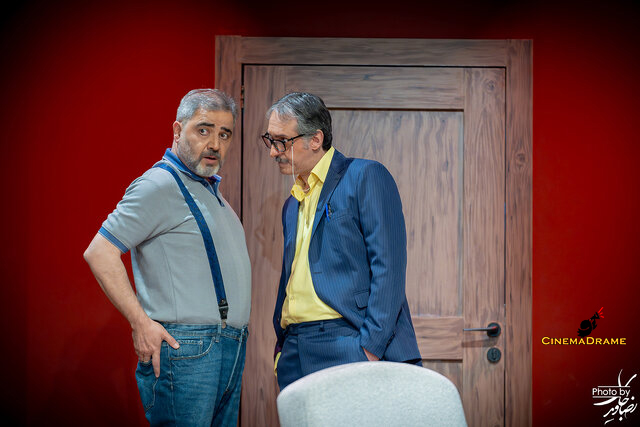
“Taming the Wooden Horse” Play Details
The play “Taming the Wooden Horse” is co-written by Sina Razani and Nima Nafe. Its synopsis states: “It is the world of a wealthy and rich individual whose pastime, and that of his friends, is to find naive and unsophisticated people and take them into their circle under various pretexts to, as they say, ‘make fun of them.’ But on the night of one such gathering, the situation becomes very complicated for one of these wealthy individuals, in a way that endangers the very foundation of his life and…”
The actors in this play (in alphabetical order) are Kamran Tafti, Mostafa Sasani, Sania Salari, Ramin Sayardashti, Elaheh Shahparast, and Atabak Naderi. This theatrical work is staged every night at 8:00 PM for 75 minutes at Chaharsoo Hall of the City Theater Complex. / ISNA
